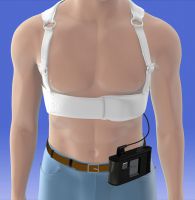Understanding the Difference Could Save Your Life

So, what’s the difference?
A heart attack is a blood flow problem, caused by a blockage. The victim is usually awake, and while symptoms can vary (particularly among men and women), it is often associated with chest pain, shortness of breath, nausea or sweating.
Sudden cardiac arrest (SCA) is an electrical problem, caused by a disruption in the heart’s electrical system. The victim quickly loses consciousness with little or no warning signs, has no pulse and ceases to breathe normally.
Both are very serious, but in the case of SCA, treatment in the form of CPR and a defibrillator must start immediately, as the chances of survival decrease by 10 percent with each minute that passes.
How are they related?
 While there are many causes of SCA, including underlying (and often undetected) heart rhythm disorders, one of the most common risk factors is a recent heart attack. The dead muscle from a heart attack can make the heart electrically unstable, putting patients at greater risk for SCA.
While there are many causes of SCA, including underlying (and often undetected) heart rhythm disorders, one of the most common risk factors is a recent heart attack. The dead muscle from a heart attack can make the heart electrically unstable, putting patients at greater risk for SCA.
With more than 1.5 million Americans suffering heart attacks each year, that’s a lot of people who may not realize they’re at increased risk for SCA.
Please check out the Future of Personal Health feature, which shares the story of Andy Graber, who survived both a heart attack and SCA. His story is all too common, and one we hope will help save others. He was fortunate that his doctor prescribed a LifeVest wearable defibrillator after his heart attack, and that device helped save his life.
Once you read, please share the story with others, comment here to share with us your own experience, and feel free to ask questions. We hope a continued conversation about SCA and heart attack will help to educate more of the public and, ultimately, save more lives.
By Carissa Caramanis O’Brien (@CarissaO), Member, Sudden Cardiac Arrest Foundation Board of Directors
- Log in to post comments
